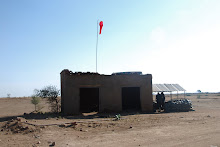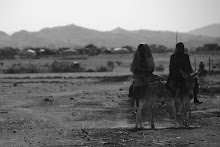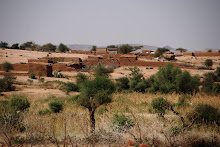The pace of change in Darfur has been blindingly fast over the past weeks - we’ve seen JEM take and then withdraw from Muhajeriya town, their flight and pursuit by GoS across a wide swath of Darfur, an alleged preemptive attack by JEM on the GoS stronghold on Malam, sustained bombardment of vast areas and a huge population movement, shifting alliances and surprise fighting between groups and former allies on the ground, peace talks beginning in Doha concurrently with a high level UN leak about the ICC warrant and subsequent denial by the ICC.
One theory holds that it has all been an accident – that the clash in Muhajeriya in mid-January which sparked the rest was an accidental escalation of a personal feud between two mid level commanders. Once the fighting started, JEM took the town and then didn’t know quite what to do with it.
Regardless of the reasons, the consequences have been enormous - and the disjointed response by peacekeepers and the international community has again shown that the intellectual challenges of peacekeeping are often far greater that the physical.
Two major consequences of the fighting have presented serious dilemmas to the mission. The first is the sudden and unexpected movement of thousands people from South Darfur (Muhajeriya, Sheria, Abu Dangal, and surrounding villages) to over-crowded camps in North Darfur. The second is the equally unexpected wave of shifting alliances which has left unclear who is in control of which territory and where things may lead.
The first priority is attending to the immediate food, shelter, hygiene, and medical needs of thousands of exhausted and dehydrated displaced. Yet the numbers and method of displacement has raised questions that may influence the way aid is delivered. The organization of the displaced - most have arrived on rented trucks packed with belongings – has caused speculation that the movement is a deliberate relocation of SLA/M supporters to areas of humanitarian relief to ensure provisions for the armed group as it looses territory. If the arrivals are a blatant ploy, how should humanitarians respond?
Additional speculation exists as to why the displaced have come so far north when there are closer camps and areas of refuge. It could be a natural tendency to displace towards kinship groups, or it could be a conscious return-migration - most of the new displaced are Zaghawa communities originally from North Darfur who relocated to the Muhajeriya area during a severe drought in 1973. In the latter case, their arrival could complicate the return process significantly. How should humanitarians assist communities who are potentially moving to reclaim old land they haven’t inhabited in 30 years?
On the political front, the first sign of shifting alliances was the surprise disarming if SLA/M (a partner in the government) by GoS discussed in my previous post, and the quick power changes continue to cause confusion. The movement of JEM fighters hundreds of miles from their bases in Chad to Muhajeriya and back again created suspicion between armed groups on the ground that one or the other was complicit in the attack. This tension is particularly apparent between GoS and SLA/M (the sole signatory of a peace agreement) combatants who have joint-control of some areas of Darfur. These suspicions have caused assassinations, proxy battles, and retaliation resulting in hundreds of deaths and a deterioration of confidence slowly built since the partnership was established in 2005.
The smaller, fringe rebel movements are shifting gears quickly trying to stay on the winning side of the battle, and many are hiring out to either side of the conflict. It is now unclear who controls large parts of North Darfur – including the volatile areas where humanitarian presence is most needed.
The uncertainty of what may happen in coming weeks has been reflected in the same-day announcement and denial of the decision to issue an ICC warrant for President Bashir. I believe the leak of the decision by the UN was deliberate. Because things are changing so quickly on the ground the UN does not want to situation to stabilize (with an agreement between GoS and JEM) and then be thrown off again by the warrant. I think the leak was intended to allow commanders to take the facts into consideration during the times of instability, so that a warrant won’t come as a shock.
Saturday, February 14, 2009
Subscribe to:
Post Comments (Atom)













































No comments:
Post a Comment